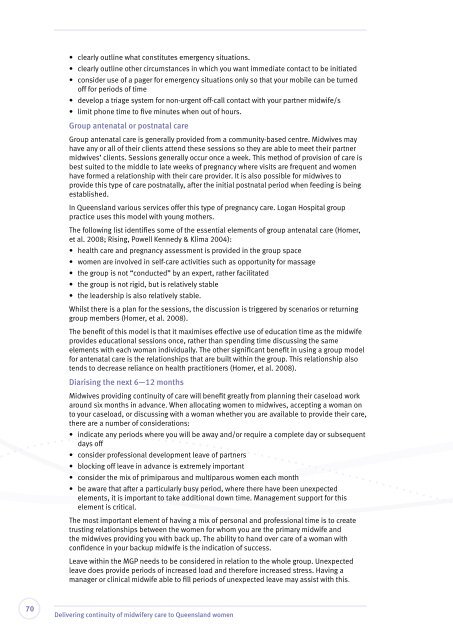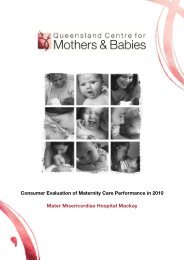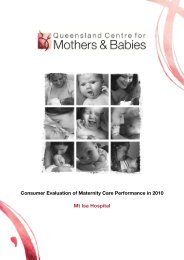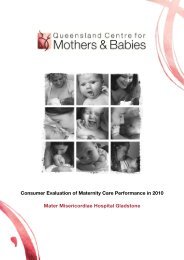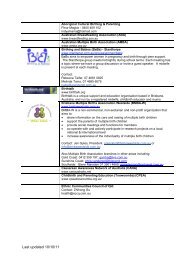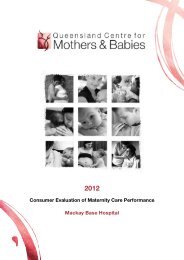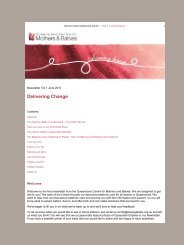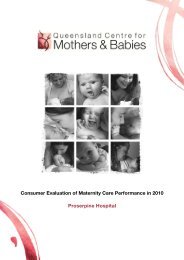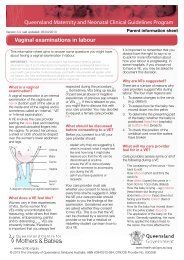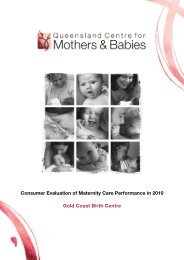Delivering continuity of midwifery care to Queensland women
Delivering continuity of midwifery care to Queensland women
Delivering continuity of midwifery care to Queensland women
Create successful ePaper yourself
Turn your PDF publications into a flip-book with our unique Google optimized e-Paper software.
• clearly outline what constitutes emergency situations.<br />
• clearly outline other circumstances in which you want immediate contact <strong>to</strong> be initiated<br />
• consider use <strong>of</strong> a pager for emergency situations only so that your mobile can be turned<br />
<strong>of</strong>f for periods <strong>of</strong> time<br />
• develop a triage system for non-urgent <strong>of</strong>f-call contact with your partner midwife/s<br />
• limit phone time <strong>to</strong> five minutes when out <strong>of</strong> hours.<br />
Group antenatal or postnatal <strong>care</strong><br />
Group antenatal <strong>care</strong> is generally provided from a community-based centre. Midwives may<br />
have any or all <strong>of</strong> their clients attend these sessions so they are able <strong>to</strong> meet their partner<br />
midwives’ clients. Sessions generally occur once a week. This method <strong>of</strong> provision <strong>of</strong> <strong>care</strong> is<br />
best suited <strong>to</strong> the middle <strong>to</strong> late weeks <strong>of</strong> pregnancy where visits are frequent and <strong>women</strong><br />
have formed a relationship with their <strong>care</strong> provider. It is also possible for midwives <strong>to</strong><br />
provide this type <strong>of</strong> <strong>care</strong> postnatally, after the initial postnatal period when feeding is being<br />
established.<br />
In <strong>Queensland</strong> various services <strong>of</strong>fer this type <strong>of</strong> pregnancy <strong>care</strong>. Logan Hospital group<br />
practice uses this model with young mothers.<br />
The following list identifies some <strong>of</strong> the essential elements <strong>of</strong> group antenatal <strong>care</strong> (Homer,<br />
et al. 2008; Rising, Powell Kennedy & Klima 2004):<br />
• health <strong>care</strong> and pregnancy assessment is provided in the group space<br />
• <strong>women</strong> are involved in self-<strong>care</strong> activities such as opportunity for massage<br />
• the group is not “conducted” by an expert, rather facilitated<br />
• the group is not rigid, but is relatively stable<br />
• the leadership is also relatively stable.<br />
Whilst there is a plan for the sessions, the discussion is triggered by scenarios or returning<br />
group members (Homer, et al. 2008).<br />
The benefit <strong>of</strong> this model is that it maximises effective use <strong>of</strong> education time as the midwife<br />
provides educational sessions once, rather than spending time discussing the same<br />
elements with each woman individually. The other significant benefit in using a group model<br />
for antenatal <strong>care</strong> is the relationships that are built within the group. This relationship also<br />
tends <strong>to</strong> decrease reliance on health practitioners (Homer, et al. 2008).<br />
Diarising the next 6—12 months<br />
Midwives providing <strong>continuity</strong> <strong>of</strong> <strong>care</strong> will benefit greatly from planning their caseload work<br />
around six months in advance. When allocating <strong>women</strong> <strong>to</strong> midwives, accepting a woman on<br />
<strong>to</strong> your caseload, or discussing with a woman whether you are available <strong>to</strong> provide their <strong>care</strong>,<br />
there are a number <strong>of</strong> considerations:<br />
• indicate any periods where you will be away and/or require a complete day or subsequent<br />
days <strong>of</strong>f<br />
• consider pr<strong>of</strong>essional development leave <strong>of</strong> partners<br />
• blocking <strong>of</strong>f leave in advance is extremely important<br />
• consider the mix <strong>of</strong> primiparous and multiparous <strong>women</strong> each month<br />
• be aware that after a particularly busy period, where there have been unexpected<br />
elements, it is important <strong>to</strong> take additional down time. Management support for this<br />
element is critical.<br />
The most important element <strong>of</strong> having a mix <strong>of</strong> personal and pr<strong>of</strong>essional time is <strong>to</strong> create<br />
trusting relationships between the <strong>women</strong> for whom you are the primary midwife and<br />
the midwives providing you with back up. The ability <strong>to</strong> hand over <strong>care</strong> <strong>of</strong> a woman with<br />
confidence in your backup midwife is the indication <strong>of</strong> success.<br />
Leave within the MGP needs <strong>to</strong> be considered in relation <strong>to</strong> the whole group. Unexpected<br />
leave does provide periods <strong>of</strong> increased load and therefore increased stress. Having a<br />
manager or clinical midwife able <strong>to</strong> fill periods <strong>of</strong> unexpected leave may assist with this.<br />
70<br />
<strong>Delivering</strong> <strong>continuity</strong> <strong>of</strong> <strong>midwifery</strong> <strong>care</strong> <strong>to</strong> <strong>Queensland</strong> <strong>women</strong>


